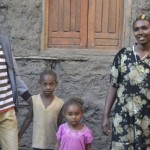 Leaders from all religious traditions smooth the way for contraception on the idea that sprawling families in poor conditions are not healthy for kids or moms.
Leaders from all religious traditions smooth the way for contraception on the idea that sprawling families in poor conditions are not healthy for kids or moms.
Religious figures have been preaching the gospel of family planning here in Africa’s second most populous nation. The result: a whittling of the fertility rate, and a leap in contraceptive use.
In Ethiopia, where the population is devout and widely scattered, local religious figures exercise far more authority than government officials or the young female health workers they send out across the country.
The poverty and high mortality rates in many communities have led to an unusual level of support for contraception among Ethiopia’s religious leaders. Pastors, priests, and imams are paving the way for the birth control that the government is making available for pennies.
Recommended: Think you know Africa? Take our geography quiz.
It is a pragmatism born of problems with poverty that don’t exist in many Western countries. Religious leaders are now seen as one of the most powerful tools in development workers’ hands across sub-Saharan Africa, from Kenya to the Ivory Coast to the Democratic Republic of the Congo.
“A pastor who is living in a certain community – he observes the problems of the community. He sees a pregnant woman who is suffering because she has many children and there is nothing to eat,” says Tilahun Seifu, a development worker with Ethiopia’s Lutheran church. “He observes also a woman who is dying from delivery. Daily they observe this … The problem itself tells you the need of using contraception.”
Several years ago, men like Mr. Tilahun and Abeya Wakwoya – who also works for the Lutheran church, known here as the Ethiopian Evangelical Church Mekane Yesus – set out for rural parts of Ethiopia to speak with religious leaders.
Their goal was not to directly distribute contraceptives but to create a receptive audience for the government health workers who followed them into the community with subsidized or free pills, implants, injections, and intrauterine devices (IUDs).
Sitting down with both Christians and Muslims, Tilahun and Mr. Abeya pointed to the problems of hunger and unsafe childbirth brought on by families that were too large. They asked these local faith leaders if they saw the benefits of modern birth control amid such conditions.
Their message appears to be catching on. Contraception use is up, from 8 percent of married women in 2000 to 29 percent in 2011, according to Ethiopia’s last Demographic and Health Survey in 2011. The fertility rate is down to 4.8 children per family from 5.9 in 2000, according to the survey, although still well above the three children most women say they want.
In a sprawling mostly rural country it is not possible to pinpoint how many families were convinced by religious leaders. But in more than a dozen interviews, Ethiopian men and women said they had felt initial qualms about contraception – but that messages from faith leaders helped change their minds.




























Join Conversations